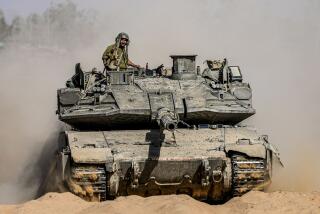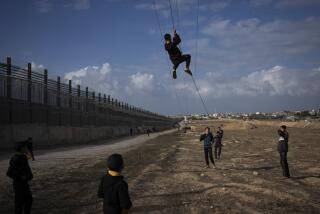Egypt beefs up security after deadly attack
CAIRO -- Egyptian security forces have again bolstered their presence in the restive Sinai Peninsula as the country mourns 11 soldiers killed in a suicide car bombing Wednesday.
A battle in Sinai between security forces and Islamic militants sympathetic to ousted President Mohamed Morsi has left at least 80 people dead since Morsi’s ouster in a popular military coup in July, prompting security forces to launch a wide-scale offensive targeting militants and other outlaws in the area.
Wednesday’s attack, the deadliest since August, when 25 policemen were killed in an assault on their convoy, moved authorities to raise their levels of alert and take more aggressive measures against lawlessness.
Egypt’s military-backed interim government on Thursday passed a series of decrees tailored specifically to the country’s battle against terrorism. In a statement, the Cabinet requested the formation of an special prosecution unit to deal specifically with terrorism-related crimes.
Gen. Abdel Fattah Sisi, Egypt’s army chief and defense minister, promised the families of the slain soldiers “swift justice.” Speaking at the soldiers’ funeral in Cairo, Sisi said the “war against terrorism is the only real condolence.”
“We are not afraid of being shot with the bullets of treachery for the sake of this nation,” Sisi said during the eulogy. “We are here to stop them and fight them with our lives, no matter the sacrifices, for we do not fear death because we will be martyrs before God.”
On his Facebook page, military spokesman Col. Ahmed Ali said 29 militants were arrested Thursday during an army raid on northern Sinai cities. He added that about 17 houses were destroyed in the raid, two of which belonged to notoriously dangerous leaders of militant groups with connections to Al Qaeda.
An unnamed security official told the official Egyptian news service Friday that police and military authorities have joined forces to bolster their presence along the roads connecting Suez and the Sinai Peninsula, adding that local Bedouin tribes in the area are cooperating fully to bring an end to the mounting threat.
The official said security forces have set up stationary and mobile roadblocks on roads connecting the Suez Canal cities with Sinai to prevent terrorists and outlaws from fleeing the area.
[Updated, 6:07 a.m. PST Nov. 22: Egyptian authorities have also shut down the Rafah border crossing, connecting Egypt with the Gaza Strip, for an indefinete period.
Authorities suspect that ties between Morsi’s group, the Muslim Brotherhood, and Hamas, its counterpart in Gaza, help fuel violence in Egypt, with militants coming in and out through the border crossing and illegal smuggling tunnels the Egyptian military has been routinely destroying for months.]
In local media, security officials have expressed concerns that violence might be migrating to the capital and other governorates, especially in light of continuing pro-Morsi protests.
On Thursday night, Police Capt. Ahmad Abu Doma died from a gunshot wound to the chest when two assailants shot at his checkpoint in the Suez Canal city of Islamiliya. One of the attackers was arrested and is being investigated, according to local reports.
Another officer, Capt. Ahmed Samir Mahmoud, was also shot and killed Thursday in Qalyobiya, just outside of Cairo. Mahmoud was part of an operation targeting militants in the area who had been implicated in the killing of a high-profile security official earlier in the week.
Lt. Col. Mohammad Mabrouk, who was in charge of investigations concerning Islamist militants, was shot seven times outside his house in the capital last week.
Morsi’s mainly Islamist supporters have repeatedly denied their involvement in acts of violence, accusing authorities of orchestrating and fabricating accusations against them.
“The path of the revolution will still continue, increasing not decreasing, going forward and not back, against the coup of injustice, oppression, and blood,” a statement issued Friday by an anti-coup alliance stated.
Protests calling for Morsi’s return have been continuous since his ouster. Gatherings have been smaller, however, since security forces violently broke up two sit-in camps in Cairo last August, at Rabaa Al Adawiyah and Nahda squares.
Protests are scheduled for Nov. 29 to commemorate the passing of 100 days since the raids that left 1,000 people dead, according to some reports.
In an effort to contain potential violence, Interior Ministry forces have sealed off Rabaa Al Adawiyah Square to traffic, despite the relatively small gatherings.
ALSO:
Iran appears to stiffen demands at nuclear talks
Ukraine bows to Russian pressure, suspends EU entry bid
Supermarket roof collapses in Latvia; dozens may be trapped
Hassieb is a special correspondent.
More to Read
Sign up for Essential California
The most important California stories and recommendations in your inbox every morning.
You may occasionally receive promotional content from the Los Angeles Times.










